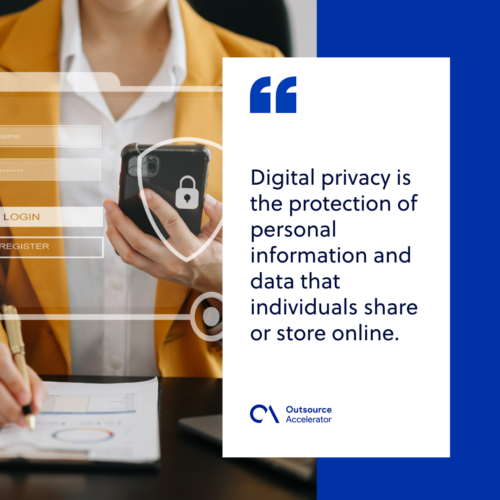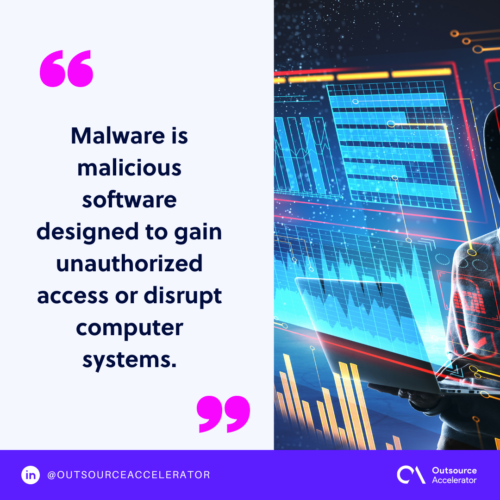Digital privacy 101: How to protect your online data

The issue of digital privacy has become one of the most significant concerns for online users. It’s essential that we all become more aware of the importance of protecting our digital privacy. Especially with data breaches and cyber-attacks on the rise.
A report by Exploding Topics revealed 85% of adults worldwide want to do more to protect their online privacy. It also stated that 80% are concerned about their digital security, and 51% don’t know how to protect it.
So what can we do to keep our digital privacy intact? Below is a guide that’ll help you get started.
What is digital privacy?
Digital privacy refers to the protection of personal data and information shared online in the fast-paced digital world.
It involves the measures taken to safeguard sensitive data from unauthorized access, use, or disclosure.
With the increasing prevalence of online activities, understanding and maintaining digital privacy has become crucial for individuals and businesses alike.

Why is digital privacy important?
Digital privacy is important because it protects your personal information from being accessed for nefarious purposes.
Digital privacy is crucial in our modern era due to the pervasive presence of data brokers.
Here are some key reasons why we all need it:
Protects against identity theft
Cybercriminals employ various techniques to steal personal information and perpetrate identity theft. Protecting your digital privacy can mitigate the risk of falling victim to such crimes.
Safeguarding sensitive data, such as Social Security numbers, banking details, and passwords, helps prevent unauthorized access and misuse.
Preserves personal reputation
In today’s interconnected world, online reputation holds significant value.
Digital privacy empowers people to control what information is available about them on the internet. They can protect themselves from potential reputational harm by managing their privacy settings and limiting access to personal data.
Safeguards confidentiality
For businesses and professionals, digital privacy is vital in maintaining the confidentiality of proprietary information, trade secrets, and sensitive client data.
By implementing robust security measures, organizations can protect their intellectual property and maintain a competitive edge in the market.
Types of digital privacy threats
Various types of digital privacy threats can put your personal data at risk. Below are some of the most common ones:
1. Phishing scams
Phishing scams involve deceiving individuals into revealing their personal information. Scammers look for personal details by posing as trustworthy entities.
These attacks often occur through deceptive emails, fake websites, or phone calls. Security company Egress reports phishing is the second top cause of data breaches.
2. Data breaches
Data breaches occur when unauthorized individuals access sensitive data stored by organizations or service providers.
This violation of digital privacy can expose personal information and financial data. Data breaches can result from security vulnerabilities, insider threats, or targeted attacks.
3. Malware and ransomware
Malware is malicious software designed to gain unauthorized access or disrupt computer systems. While ransomware is a specific type of malware that encrypts data and holds it hostage until a ransom is paid.
These threats can infect devices through email attachments, compromised websites, or malicious downloads.
In the last year, ransomware accounted for 20% of all cyber crimes.
4. Social engineering
Social engineering techniques exploit human psychology to manipulate people into divulging sensitive information.
Attackers may impersonate trusted individuals or use psychological manipulation tactics.
This lets them deceive victims and gain access to their personal data.
5. Man-in-the-middle (MITM) attacks
MITM attacks are hackers intercepting communications between two parties without their knowledge. They eavesdrop, modify, or inject malicious content into a conversation.
MITM attacks can compromise the confidentiality and integrity of the data exchanged between parties. It can expose sensitive information such as passwords, financial details, or personal conversations.

Protecting your digital privacy
Fortunately, there are several measures you can take to safeguard your digital privacy and protect your personal data. Here are some things you can do to strengthen your online security:
Best practices for digital privacy and internet security
- Your devices and software should keep up with the latest security patches and updates.
- Enable two-factor authentication to add an extra layer of security to your accounts.
- Be cautious while clicking links or downloading attachments from unfamiliar or suspicious sources.
- Review and adjust your online accounts’ privacy settings regularly to control shared data.
- Educate yourself about common online scams and phishing techniques to better identify potential threats.
Tips for creating strong passwords and securing your accounts
- Avoid using easily guessable passwords like your name, birthdate, or common phrases.
- When creating passwords, use a mix of uppercase and lowercase letters, numbers, and special characters.
- Aim for longer passwords (at least 12 characters).
- Avoid reusing passwords to prevent a single breach from compromising multiple accounts.
- Consider using reputable password managers to generate and securely store complex passwords.
Strategies for online personal data protection
- Limit the personal information you share on social media platforms or other websites.
- Be cautious while providing personal data on online forms or surveys.
- Avoid oversharing personal details in public forums or online communities.
- Encrypt sensitive data, like financial information or confidential documents, before transmitting them online.
- Organizations can look into outsourcing cybersecurity. Having experienced professionals provided by leading third-party service providers like Acquire Intelligence protecting their digital privacy can be useful.
Tools and software for enhancing your online privacy
- Use virtual private networks (VPNs), which provide a secure and private internet connection. Especially when you’re accessing public Wi-Fi networks.
- Install antivirus software that helps detect and remove malware threats from your devices.
- Utilize messaging apps that offer end-to-end encryption. It ensures that only intended recipients can access your messages.
- Install ad-blocking extensions or plugins. They can reduce the exposure to online ads that may track your online activities.
- Using privacy-focused web browsers provides additional security features, such as blocking third-party cookies and preventing tracking.







 Independent
Independent




